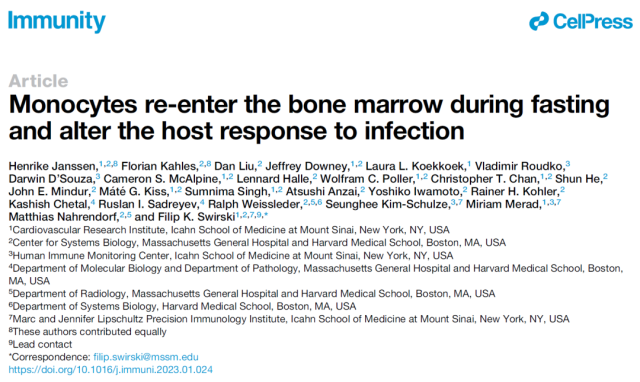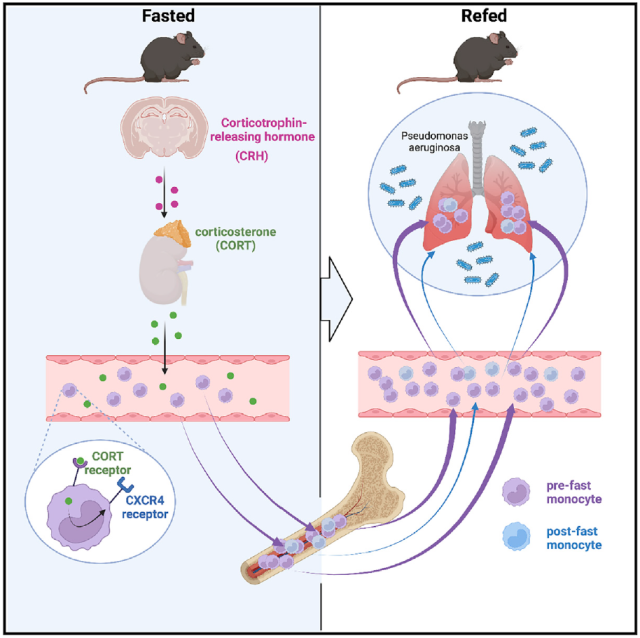Does skipping breakfast damage the immune system?
- Normal Liver Cells Found to Promote Cancer Metastasis to the Liver
- Nearly 80% Complete Remission: Breakthrough in ADC Anti-Tumor Treatment
- Vaccination Against Common Diseases May Prevent Dementia!
- New Alzheimer’s Disease (AD) Diagnosis and Staging Criteria
- Breakthrough in Alzheimer’s Disease: New Nasal Spray Halts Cognitive Decline by Targeting Toxic Protein
- Can the Tap Water at the Paris Olympics be Drunk Directly?
Does skipping breakfast damage the immune system?
- Should China be held legally responsible for the US’s $18 trillion COVID losses?
- CT Radiation Exposure Linked to Blood Cancer in Children and Adolescents
- FDA has mandated a top-level black box warning for all marketed CAR-T therapies
- Can people with high blood pressure eat peanuts?
- What is the difference between dopamine and dobutamine?
- How long can the patient live after heart stent surgery?
Does skipping breakfast damage the immune system? Possible health risks of fasting.
Diet has a profound impact on physiology. Caloric restriction and fasting appear to be beneficial , although excess nutrition increases disease risk by affecting immunity and metabolism .
Despite the multiple associations between diet and health, the biology behind them remains unclear.
On February 23, 2023, researchers from the Icahn School of Medicine at Mount Sinai and the Massachusetts General Hospital of Harvard Medical School published an article titled: Monocytes re-enter the bone marrow during fasting and alter the host response to research paper on infection .
The study on fasting breakfast in a mouse model suggests that fasting may be bad for fighting infection and may increase the risk of heart disease , helping to better understand the effects of long-term fasting on the body .
Specifically, the study identified a fasting-induced switch in monocyte migration, extending monocyte lifespan and altering the body’s susceptibility to disease.
Fasting induces a rapid return of monocytes from the blood to the bone marrow, which is a safe haven for monocytes, but after refeeding, these monocytes quickly return to the blood, and their return is through the hypothalamus- pituitary- Regulated by the adrenal (HPA) axis-dependent release of corticosterone.
These changes can lead to changes in how the body responds to infection. These findings suggest that diet, and in particular the temporal homeostasis of diet, regulates monocyte lifespan in response to external stress.
The research team said that more and more people are aware of the health benefits of fasting, and indeed there is ample evidence for the benefits of fasting. But the study raises a caveat — fasting may also pose health risks .

In this study, the research team aimed to better understand how fasting (ranging from short fasts of a few hours to 24-hour fasts) affects the immune system, from relatively short fasts of only a few hours to a more severe 24-hour fast.
They conducted experiments on two groups of mice. One group of mice ate breakfast (the largest meal of the day) immediately after waking up ; the other group of mice did not eat breakfast. Then blood samples were collected when the two groups of mice just woke up, 4 hours and 8 hours.
Blood tests showed significant differences in the fasted mice, specifically, the research team found a difference in the number of monocytes in them.
Monocytes are white blood cells produced in the bone marrow that travel with the blood in the body and play many key roles in fighting infections, heart disease and cancer, among other things.
Upon waking up, all mice had the same number of monocytes. But after 4 hours, the monocytes of the fasted mice were significantly affected, with 90% of their monocytes disappearing from the blood, and after 8 hours, this number dropped further. At the same time, the monocytes of mice in the non-fasted group were not affected.
In the fasted group of mice, the research team found that monocytes in their blood returned to dormancy in the bone marrow.
At the same time, the production of new cells in their bone marrow decreased. Monocytes (which are usually short-lived) in the bone marrow undergo marked changes.
By remaining in the bone marrow, these monocytes survived longer and aged differently than monocytes that remained in the blood.
The research team continued by fasting the mice for 24 hours and then refeeding them.
The results showed that monocytes that had returned to the bone marrow surged back into the blood within hours.
This surge leads to elevated levels of inflammation, and instead of protecting against infection, these altered monocytes are more inflammatory, making the body less resistant to infection.

The study is the first to establish a link between the brain and immune cells during fasting.
The research team found that during fasting, a specific region of the brain controls the response of monocytes. The study shows that fasting triggers a stress response in the brain – which is why people ” hangry ” (feeling hungry and angry) – and this stress response immediately triggers a mass release of monocytes from the blood Migrates to the bone marrow, then returns to the blood again shortly after refeeding.
Filip Swirski , senior author of the paper , emphasized that many studies have shown that fasting has metabolic benefits, but this new study shows that fasting reduces the number of circulating monocytes, which may be a good thing because these cells are an important part of inflammation.
However, refeeding causes a flood of these monocytes into the blood, which can be problematic.
Therefore, fasting may not always be beneficial for health, and may bring about problems in the body’s ability to deal with infection, and these monocytes are very important for other diseases such as heart disease or cancer.
Understanding how their function is regulated is very important. .
Paper link :
https://doi.org/10.1016/j.immuni.2023.01.024
Does skipping breakfast damage the immune system?
(source:internet, reference only)
Disclaimer of medicaltrend.org
Important Note: The information provided is for informational purposes only and should not be considered as medical advice.



